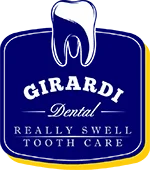Dental Crowns in St. Catharines, ON
Do you need a cracked, chipped, or misshapen tooth restored to its original shape, size, and function? Dental crowns are popularly preferred due to the painless procedure and lasting effects.
Our team of highly trained dentists near you provides an array of dental restorations, including veneers, dental bridges, dental crowns, dental implant crowns, partials, and full dentures. Please feel free to contact Girardi Dental to book an appointment with your nearest dentist.
How Dental Crowns in St. Catharines, ON Help
Dental Crowns are versatile, durable, and reliable restorations that offer a host of benefits, such as:
- Restoring a severely cracked or broken tooth
- Protecting a weakened tooth after repeated treatments or root canal therapy
- Covering a discolored, misshapen, worn down tooth or an implant
- Supporting a dental bridge
Please contact our team of skilled dentists for consultation and treatment planning for dental crowns near you.
The Dental Crown Procedure
One of our skilled dentists will first x-ray your tooth to check for the extent of damage or decay. If needed, we may treat the decay or perform root canal therapy before placing a crown.
The procedure for placing crowns is straightforward:
Step 1
After administering local anesthesia, one of our reliable dentists in St. Catharines, ON, will first prepare the tooth enamel. We do this by carefully grinding down the tooth structure to make space for the crown.
Step 2
After filing down the enamel, we will take precise impressions of the tooth to send to a lab to fabricate the crown. Traditional crowns cover the tooth until the gum line, while ¾ crowns cover a portion of the tooth. ¾ crowns are suitable for teeth that continue to retain a solid structure.
Step 3
Our experienced dentists at Girardi Dental will place a temporary crown on the tooth for a short-term duration until the permanent one is ready.
Step 4
We will replace the temporary crown with a metal, all-ceramic, all-porcelain, or porcelain-fused-to-metal crown and use dental adhesive to bond the crown into place.
We will examine crowns for fit and comfort and may repair, adjust, or replace the crown in case of damage or wear.
Dental Crown FAQs
If a tooth becomes cracked or broken, a dental crown is one of the most effective solutions to restore function to the tooth. The crown covers the surface of the damaged tooth, protecting it from harm and making it possible to chew with the tooth again.
A crown is usually necessary to protect the tooth from further damage and to prevent infection and debris buildup in the damaged part of the tooth. Leaving it untreated can cause a multitude of dental problems.
A dental onlay is another option that is sometimes available instead of a crown. Whether or not a tooth needs a crown or an onlay is determined by how damaged the tooth is. Our dentist can fix a minor crack or surface damage with an onlay, but if the tooth is severely cracked or broken, a crown is the most effective solution.
Onlays are placed over the tooth's chewing surface but are less noticeable and intrusive than dental crowns. Still, they offer less protection, which is why they are only usable in certain situations.
Teeth can decay under a crown. Though the tooth is cleaned and prepared for a crown, it is still possible for a cavity to form where the crown covers. If the crown and tooth are not cared for properly, bacteria can build up underneath the crown and cause a cavity.
If a cavity forms, the crown must be removed, the cavity treated, the area cleaned thoroughly, and the crown placed back over the tooth.
Yes. Only a small percentage of teeth need root canals before receiving a crown. Some patients that get a crown also need a root canal because the tooth was already in poor shape before needing the crown or the tooth becomes damaged in such a way that it exposes the root system.
A root canal protects a tooth's root system and prevents infection and other problems. If one is necessary before a crown, it is to keep the tooth healthy enough for the crown.
The crown cost can vary based on how much work is needed before installation, but the average cost ranges from $900 to $1,500 per tooth.














